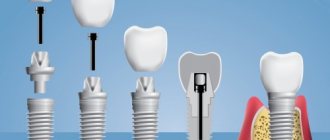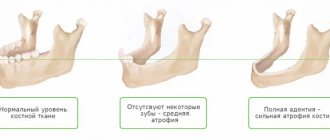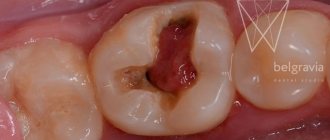Dental implantation for diabetes mellitus has become possible in modern dental practice. The patient needs to visit an endocrinologist in a timely manner, monitor the amount of glucose in the blood and prevent the disease from moving into an acute stage. However, most of the responsibility lies with the implant surgeon. Qualified professionals at the Implantmaster clinic will select the necessary technique for performing surgery and recovery afterwards.
Many people with diabetes believe that implantation is completely contraindicated for them. However, studies performed in this area have shown the success of implantation of titanium rods. Of course, an important aspect is preparatory measures, supportive therapy, close attention at all stages of the operation by the doctor, and medical equipment. institutions.
In innovative dental implantation for diabetes, it is carried out by qualified doctors who regularly improve their operational skills and knowledge from the best European lecturers. Our doctors master the latest modern implantation techniques. They use specialized diagnostic technologies to place implants, setting loyal prices for services. We solve difficult problems in a short time.
In the article you will learn about the peculiarities of the effect of diabetes mellitus on dental units and the installation of implants. We will tell you in detail about the stages of surgical intervention, indications and limitations for the procedure. We will introduce you to the cost of manipulations and restoration measures.
Get a consultation
We will answer all your questions before visiting the clinic!
+7
Online registration
Content
1 The impact of diabetes on dental health
2 Is it possible to get implants for type 1 and type 2 diabetes? 2.1 Contraindications to implantation in diabetes
2.2 Indications for installation of implants for diabetes
3 Stages of dental implantation for diabetes
4 Conditions for successful implantation for diabetes at the Implantmaster clinic
5 Rehabilitation after dental implantation for diabetes
6 Cost of dental implantation for diabetes
7 Alternatives to implantation for diabetes
The impact of diabetes on dental health
“Are implants used for diabetes?” - This is a question asked by all patients with this disease. The answer is “YES,” but the patient needs to monitor the development of the pathology, and the doctor needs to monitor the preparation, performance of the operation and recovery.
When the glucose level in the blood increases, its negative effect on the body increases - conditions are created for the occurrence of certain pathological conditions of the oral cavity:
- Hyposalivation (little salivation). Dry mucous membranes and insufficient formation of pellicle (protective film) lead to the destruction of enamel and the development of caries.
- When the values are too high, acetone is released, which increases the disturbance of mineral metabolism in the enamel.
- Inflammatory processes in gingival tissue. The tooth's hard tissue structures, ligamentous apparatus (mobility), and bone tissue are destroyed. Wound healing takes a long time, and with the addition of infection, pus forms.
- Fungal infections (Candidiasis). As the fungus spreads, everything in the mouth and nasopharynx becomes covered with a film (whitish coating).
- Accumulation of bacteria. Generalized (multiple) caries develops.
- Regeneration failed. Wounds heal slowly, ulcers and pockets of chronic infection form.
Features of the disease
In diabetes mellitus, the patient's body is not able to completely absorb glucose, since the presence of the hormone insulin is extremely low. The main symptom is an increase in blood sugar levels. Such patients have increased sensitivity to pain, weakened immunity and get tired quickly. There are a number of factors that negatively affect the patient’s oral cavity:
- constant thirst, dry mouth due to low saliva production;
- poor recognition of different tastes;
- the presence of slowly healing ulcers and wounds;
- large carious lesions due to a large amount of sugar in the saliva;
- infectious diseases of the mucous membrane (for example, candidiasis stomatitis);
- disturbed flora, which is accompanied by inflammation of the gums due to the accelerated proliferation of harmful bacteria.
To eliminate these symptoms, diabetics need to take a very responsible approach to oral hygiene, regularly visit the dentist and quit smoking, since smoking causes a narrowing of blood vessels already “exhausted” by diabetes.
Is it possible to get implants for type 1 and type 2 diabetes?
Diabetes is a pathological condition that arises due to disruption of the endocrine system and is associated with a lack of insulin. This hormone is responsible for the processing of glucose: if the pancreas does not produce a sufficient amount of insulin, or it is not properly perceived by the cells of the body, then the amount of glucose in the blood increases.
Dental implantation for diabetes mellitus is directly dependent on the type and stage of the pathology. Diabetes has a negative impact on oral structures and the healing of dental implants.
- Diabetes mellitus type 1 (insulin dependent). In most clinical cases, it occurs at a young age due to viral diseases and heredity. With this type of pathology, the pancreas does not produce insulin at all or not enough. The disease is a complicated type, so dental implantation is not performed for type 1 diabetes.
- Diabetes mellitus type 2 (non-insulin dependent). An acquired disease that develops in adults due to poor nutrition and an unhealthy lifestyle. The cellular apparatus does not perceive insulin, which leads to an increase in sugar levels. Therapy consists of normalizing nutrition and taking glucose-lowering medications. In the advanced stage, type II can turn into type I, and the patient can become insulin dependent. Dental implantation for type 2 diabetes mellitus is performed without controlling the disease with hormonal drugs. Favorable materials used for dental implants for type 2 diabetes are 100% titanium or an alloy that does not interact with organic structures.
Contraindications to implantation in diabetes
Dental implantation cannot be performed if you have diabetes mellitus if the following conditions exist:
- Dental implants cannot be installed if you have type 1 diabetes;
- the patient was diagnosed with a decompensated form of the pathology (disorder of fat metabolism, causing an increase in glucose);
- there are blood and cardiovascular diseases;
- there is no regular monitoring and consultation with an endocrinologist;
- abuse of alcoholic beverages and smoking.
Indications for implant placement in diabetes
Conditions under which implants can be placed for diabetes:
- Dental implantation can be performed for type 2 diabetes mellitus (without taking hormonal medications);
- the presence of a compensated form (glucose 7–9 mol/l before and after surgery);
- the patient receives the necessary medicinal hypoglycemic support and follows a low-carbohydrate diet;
- healing proceeds normally (damage to soft tissue structures does not lead to complications);
- bad habits are excluded;
- there are no concomitant pathologies of the blood, endocrine and cardiovascular systems;
- The patient is registered with an endocrinologist and visits him regularly.
Survival rate
The likelihood of implant engraftment in a patient with type 2 diabetes is quite high if:
- the implantation was carried out by an experienced implantologist;
- a thorough examination of the patient was carried out;
- all conditions were met that make implantation possible for people with diabetes (permissible glucose level, observation by an endocrinologist).
Scientists conducted a clinical study in which 667 people took part. A total of 2,887 dental implants were implanted, 255 of which were implanted in diabetics. Study participants were followed for 3 years after implantation. The survival rate among healthy people was 93.2%, and among patients - 92.2%.
Absolute success of implantation in a patient with diabetes cannot be guaranteed by any specialist, even with careful preparation and the pathology being in a compensated stage. People with pathologies of the endocrine system automatically fall into the risk group, and if rejection of the structure does occur, most likely the reason is not a medical error, but the body’s unwillingness to bear such loads.
For patients with pathologies of the endocrine system, it is best to choose implantation with delayed loading.
Stages of dental implantation for diabetes
In order for the result of implantation surgery for type 2 diabetes to be successful, it is necessary to make some modifications to the manipulations and the procedure itself. The main changes concern the timing of wound healing, engraftment of the titanium rod and permanent prosthetics. A patient undergoing dental implantation for type 2 diabetes usually requires more visits to the dentist.
Diagnostic measures
At this stage, according to the standards, a CT scan of the jaws is performed and a general blood test is taken. In patients with diabetes, the number of examinations is increased.
At the consultation appointment, the dentist will collect important information:
- taking an anamnesis;
- formation of a complete picture of the disease;
- patient monitoring of blood sugar levels;
- whether any surgical intervention has been performed previously;
- undergoing tissue regeneration.
Important additional factors when deciding whether to undergo implantation will be the form and duration of diabetes. It has been proven that patients with type II diabetes and only recently developed pathology tolerate the intervention better.
In the Implantmaster clinic, in order to avoid such complications, a number of preparatory measures are carried out. CBCT is performed, which produces more accurate images and less Rg radiation. Also, we have the opportunity to use the 3Shape trios scanner. 3D modeling of implantation and new smile is performed. The patient can see the future result. Our appointment is led by a neuromuscular dentist. Using specialized equipment, the tone of the chewing muscles is revealed, and when they relax, the true relationship of the jaws is determined. If necessary, it is possible to change the bite with temporary plastic structures and adapt to the natural muscle tone. On the recommendation of the attending physician, in order to achieve an optimal result, it may be necessary to perform preparatory treatment measures.
Preparation
During this period, an important goal will be to stabilize blood sugar levels with medications or diet. Also, to minimize the risk of infection during or after implantation, infectious foci are treated:
- treatment of ENT organs;
- complete sanitation of the oral cavity;
- performing sinus lift or osteoplasty (if necessary);
- atraumatic removal (in the presence of destroyed units and remaining roots), reducing the occurrence of complications and pain in postoperative rehabilitation;
- prophylactic use of antibiotics.
Installation of implants
Depending on the clinical situation, a specialist can install 1-6 implants during one surgical intervention. Also, it is possible to perform removal at the same time, and then install the implant. There are two types of surgical intervention: stage 1 or stage 2.
The placement of the implant is performed by a maxillofacial surgeon under the control of a navigational surgical template. With a large number of implants, the template helps to maintain the location of the artificial roots in the jawbone. Our specialists use the latest techniques and technologies. Premium class implants - Straumann, osseointegration of which takes about a month, and installation is possible even with low bone level. The best budget option is the Dentium implant system (Korea).
Prosthetics
With a one-stage operation, after a couple of days it is possible to install a temporary plate prosthesis. With a two-stage procedure, prosthetics are performed after 2–3 months, depending on the degree of healing and the jaw.
Zirconium dioxide crowns are used on all groups of teeth, and e.max are the most aesthetic and are used only on the anterior group of teeth from canine to canine.
What factors influence the success of implantation?
- Proper preparation for implantation surgery . Implantation can be successful only with careful hygiene and sanitization of the oral cavity. Antibacterial therapy is also necessary in the preoperative period.
- The amount of time that has passed since diabetes developed . The less time the patient suffers from the disease, the lower the likelihood of complications developing.
- The presence of concomitant diseases (dental caries, periodontitis, pathologies of the cardiovascular system, infectious diseases). These pathologies have a negative impact on the result of implantation.
- Stage and type of disease . Implantation of an artificial root is possible only with good compensation for diabetes mellitus. The likelihood of a successful implantation outcome is much higher in patients who control their health status with a special diet and without the use of glucose-lowering medications.
- Placement of implants . An artificial root, both in healthy people and in patients with diabetes, takes root much better on the lower jaw than on the upper dentition.
- Design features of the dental system . Medium-length implants (10-13 mm) have the best survival rate.
If the patient is constantly on insulin and does not cope well with high sugars, implantation is not performed due to the high risk of complications.
Conditions for successful implantation for diabetes at the Implantmaster clinic
- Maintain complete oral hygiene for the entire period of preparation, implantation and recovery. The oral cavity must be clean to prevent the occurrence of infectious processes.
- In diabetes, surgery should be atraumatic due to complicated healing. Single-stage implantation is considered the least invasive, but it is not always possible to immediately carry out an orthopedic load. With the standard two-stage technique, the use of laser and other technologies may be necessary.
- Engraftment of artificial roots takes a longer time: six months in the lower jaw and up to 9 months. on the upper jaw. In the upper jaw, the healing of implants with diabetes is more difficult.
- Strict requirements for materials and implants must be met. Medium implants (10–12 mm) made of pure titanium or specialized alloys are installed. Prosthetic structures must be bioinert, and crowns without a metal base.
Rehabilitation after dental implantation for diabetes
The successful result of implantation in the postoperative period very much depends on the actions of the patient. Certain recommendations must be followed:
- take prescribed antibiotics 10–12 days after the intervention;
- control blood glucose levels;
- maintain ideal oral hygiene;
- Visit your doctor every 2-3 days a month. When the implant is implanted, you can go to the dentist once a month;
- give up bad habits.
Cost of dental implantation for diabetes
The price of implantation for diabetes mellitus is almost the same as standard intervention. But additional consideration should be taken into account. expenses for a full examination, sanitation of the oral cavity, medications.
| Implant Straumann SLA (Switzerland) | -15% 50 000 42 500 ₽ |
| Implant Straumann SLActive (Switzerland) | -15% 55 000 46 750 ₽ |
| Implant Astra tech (Sweden) | -15% 55 000 46 750 ₽ |
| Implant Nobel Biocare (Sweden) | -15% 55 000 46 750 ₽ |
| Anthogyr implant (France) | -15% 40 000 34 000 ₽ |
| Dentium implant (South Korea) | -15% 35 000 29 750 ₽ |
INSTALLING THE GINGIVAL FORMER
| -100% 5 000 0 ₽ |
| Complete list of prices for dental implants » |
To find out exactly about the possibility of implantation with diabetes in your clinical case, as well as about preparatory measures, you need to make an appointment with an Implantmaster specialist.
Alternatives to implantation for diabetes
If implantation for a patient with diabetes cannot be performed, one of the following types of prosthetics may be a justified alternative:
1. Removable prosthetics. Complete removable dentures made of hypoallergenic materials (nylon or acrylic) are used even for uncompensated diabetes. The disadvantage is the uneven distribution of the chewing load, which causes bone loss.
2. Fixed prosthetics. Bridge-like structures that are conveniently fixed and evenly distribute the load. For installation, there must be healthy support units in the jaw. Material: ceramics or zirconium dioxide.
Author:
What are the requirements for prostheses on implants?
For patients with diabetes, it is best to have metal-free prostheses made of zirconium dioxide or metal alloys that do not cause allergies (for example, gold). Crowns should not be excessively heavy - this prevents the correct distribution of load on the jawbone.
- Complete restoration of the dentition in just 4 days!
more detailsRoott Pterygoid Implants Sinus lift is no longer needed!
more details
Once and for life! Express implantation in 4 days with a permanent ReSmile prosthesis
more details
All-on-4, All-on-6, ReSmile, Zygomatic implantation We use all modern methods of dentition restoration
more details










